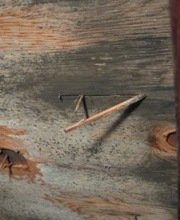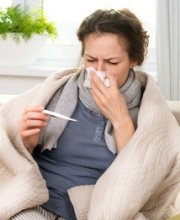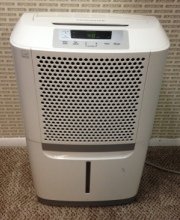Find a Mold Specialist Now
Click or Call, Toll-Free 24/7
Eurotium Amstelodami
Eurotium amstelodami can be found in a variety of places indoors, including on floors, rugs, and mattresses. It has been found on clothing and on shoes. It has also been found in hospitals, which is rather worrisome considering the fact that mold exposure has been linked to a wide range of health problems and hospital patients, including elderly people, people with respiratory problems, and those with weakened immune systems, will be especially vulnerable to mold-related illnesses.
We'll tell you who is at greatest risk, what to watch for, and what to do if you notice symptoms of illness related to mold, whether this strain or another.
Health Problems Related to Eurotium Amstelodami

Health problems related to this type of mold, especially serious health problems, are usually seen in people with compromised immune systems, such as those with HIV or AID or those undergoing chemotherapy, or those with some sort of wound or surgical incision that provides an opening for mold to enter the body. For instance, a perforation of the cornea can lead to a fungal infection of the eye, which might lead to loss of vision without prompt treatment.
Most often, mold-related illness develops after mold spores have been inhaled. Microscopic mold spores are very light and easily drift through the air. Inhalation of mold spores can cause a variety of respiratory problems, including coughing, sneezing, a runny nose, postnasal drip, a sore throat (caused by the postnasal drip), headaches, sinus infections, wheezing, bronchitis, and pneumonia. Most of these are not too serious but some can be, especially for elderly people and those with compromised immune systems. For such people, an infection like pneumonia can be fatal.
Exposure to mold can trigger asthma attacks in people with the condition. According to the Centers for Disease Control and Prevention, exposure to mold also increases the likelihood of young children developing asthma.
Who Is at Greatest Risk?
Remember, anyone can get sick due to mold exposure. However, those at greatest risk include:
- Infants and small children
- Elderly people
- Those with known allergies to mold
- Those with asthma and other respiratory disorders
- Those with weakened immune systems
- Anyone with serious health problems
- Anyone recovering from major surgery or serious injuries
- Pregnant women
Talk to your health care provider if you have questions about your personal risk factors.

What to Watch for
Symptoms of illness related to Eurotium amstelodami are similar to symptoms of illness related to other kinds of mold. If you've found mold in your home and have symptoms like coughing, sneezing, runny or stuffy nose, sore throat, headaches or migraines, sinus infections, trouble breathing, pneumonia, or an increase in asthma attacks, see your physician. Let your physician know that you've been exposed to mold.
What to Do If You've Got Symptoms of Mold-Related Illness
The first thing to do, of course, is to see your doctor. You should also notify your doctor if you're at increased risk for mold-related illness and have been exposed to mold, even if you're not experiencing any symptoms. Your doctor can let you know if you need to take any special precautions.
If you have mold in your home, whether it is Eurotium amstelodami or some other kind of mold, it's important to have it removed as soon as possible. The longer you're exposed to mold, the greater the risk to your health.
If you are experiencing health problems related to mold or are at risk for them, you should not attempt to do the work yourself because the process of removing mold from a home stirs up mold spores and increases the risk to your health, as recommended by the U.S. Environmental Protection Agency (EPA). In fact, your doctor may recommend you not even stay in your home until the mold can be removed. If you do opt to do the work yourself, you'll need to take safety precautions to avoid excessive exposure to potentially harmful mold spores.
In either case, we suggest scheduling a free consultation with an experienced mold removal professional. If you need to have someone do the work for you, a professional can complete the job quickly and safely. Even if you end up deciding to do the work yourself, you can benefit from some free expert advice. There's no cost to you and no obligation on your part. To find qualified mold removal professionals offering free consultations in your area, just follow the link.
Return From Eurotium Amstelodami To Our Main Mold Types Page
Ref: EPA
Privacy Policy Terms and Conditions Accessibility Do Not Sell My Information Disclaimer Contact Us




